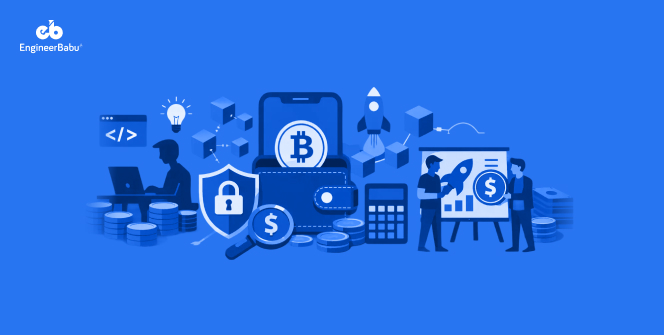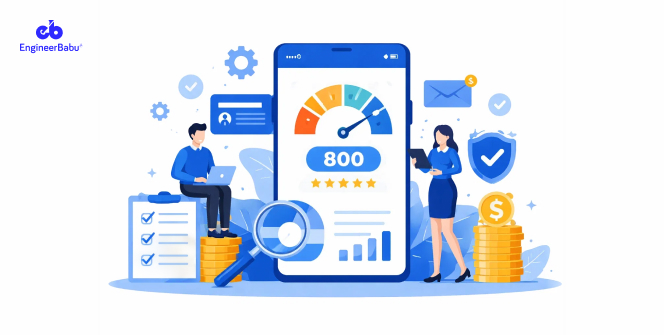Fintech chatbots are solving one of the biggest challenges in financial services, i.e., delivering fast, accurate support without driving up costs. In banking alone, customers expect immediate answers about payments, credit limits, or suspicious transactions, and any delay can erode trust.
Therefore, by automating these everyday interactions, chatbots have cut response times from hours to seconds while keeping operations lean.
And, the impact is measurable. Juniper Research reports that by 2027, chatbots will handle nearly 80% of routine customer conversations in banking and fintech. Thus, it saves the industry over $7 billion each year.
At the same time, usage patterns show that people are actively choosing them for simple queries, signalling that trust in AI-driven support is growing. That is why here we will see why people’s trust in fintech chatbots is increasing every day.
What are Fintech Chatbots?
Chatbots in fintech are AI-driven tools or agents designed specifically for financial services. Unlike general-purpose bots that simply answer FAQs, these are built to understand the complexity of banking, insurance, and investment conversations.
They use natural language processing (NLP) and machine learning to interpret customer intent, process data securely, and respond in real time.
Think of a fintech chatbot as a digital assistant that can do more than just look up account balances. It can guide a customer through the steps of opening a savings account, flag unusual transactions before fraud occurs, or explain loan eligibility in simple terms.
A key difference between fintech chatbots and standard chatbots is compliance. Financial interactions are governed by strict regulations and compliance like PCI DSS, and a chatbot in this space must be able to handle sensitive information safely.
That means encrypting data, verifying users before sharing details, and ensuring records meet audit requirements. In many cases, they are integrated directly with core banking systems or investment platforms.
In short, chatbots in financial services are more than a tech add-on. They represent a shift in how financial services think about accessibility, security, and scale. By bridging human-like interaction with back-end systems, they are redefining how people manage money in a digital-first world.
Use Cases for Fintech Chatbots
Finance chatbots are no longer side attractions. They’re doing real work like handling transactions, detecting fraud, helping users invest wisely, and more. Let’s dive into how they deliver value in practical, high-impact ways:
Instant Account and Transaction Support
Checking balances, confirming recent transactions, or transferring money shouldn’t take more than a few seconds. A banking chatbot handles these everyday tasks directly inside apps, giving customers the speed and convenience they expect.
By removing friction from simple interactions, they help financial services improve customer satisfaction while keeping support teams free to focus on more complex cases.
Loan and Credit Assistance
Applying for a loan or credit card often overwhelms users with eligibility criteria, forms, and document submissions. A fintech chatbot, with the help of ML, can simplify this journey by asking relevant questions, pre-checking eligibility, and guiding applicants through documentation.
This not only reduces application drop-offs but also shortens approval cycles. As digital lending expands, AI and ML in fintech are becoming an essential tool for both banks and fintech startups.
Fraud Detection and Security Alerts
Security alerts lose impact when they arrive too late. Chatbots provide real-time monitoring by flagging suspicious transactions instantly and asking users to confirm or deny activity.
If necessary, they can help freeze cards or initiate credential resets right inside the conversation. This immediate intervention builds trust, showing customers that their financial provider is proactive about safeguarding their money.
Personalised Financial Advice
Generic advice doesn’t resonate when it comes to money. Fintech chatbots can analyze spending patterns, income streams, and savings goals to deliver personalized suggestions.
Whether it’s nudging a customer to save more, warning about overspending, or pointing toward suitable financial products, chatbots act as accessible financial coaches. This type of personalization deepens customer relationships while promoting better financial habits.
Investment and Wealth Management
Investors often want quick updates without navigating complicated dashboards. A chatbot can summarize portfolio performance, answer questions about specific assets, or even highlight market opportunities in real time.
Also, by delivering these insights conversationally, fintech platforms give investors the confidence to make informed decisions faster. For many, it’s like having an on-demand financial advisor available anytime, anywhere.
Onboarding and KYC Verification
New customers frequently abandon sign-ups because onboarding feels cumbersome. Chatbots can streamline “Know Your Customer” checks by collecting documents, providing upload guidance, and sending reminders when steps are incomplete.
They also reduce common errors, like submitting expired IDs, by validating data instantly. For financial institutions, this means faster conversions, better compliance, and a smoother entry point into their services.
Benefits of Fintech Chatbots
While the use cases highlight what chatbots can do, the real value becomes clearer when we look at the outcomes they create. Understanding these benefits gives a sharper picture of why so many institutions are making them a core part of their digital strategy.
Round-the-Clock Availability
Customers expect uninterrupted access to financial services. Fintech chatbots deliver exactly that by providing assistance at all hours, regardless of location or time zone.
Whether it is checking account balances, reporting a lost card, or clarifying a transaction, support is no longer confined to office schedules. This constant availability improves service reliability and positions financial institutions as always accessible to their users.
Lower Operational Costs
The economics behind chatbots in financial services are straightforward. By automating repetitive queries, institutions can cut customer service expenses significantly.
For example, tasks like balance checks or loan status inquiries require no human involvement once a chatbot is in place.
When scaled across thousands of interactions daily, these small efficiencies translate into major savings. Thus, freeing budgets for innovation and new product development instead of routine support.
Scalability at Speed
Picture tax season, when thousands of people flood their bank’s customer support lines. Instead of chaos, a fintech chatbot calmly manages the surge, fielding questions simultaneously without breaking a sweat.
Unlike traditional teams that need hiring and training before they expand, bots flex instantly to meet rising demand. This elastic capacity ensures financial services never buckle under pressure, no matter how sharp the spike.
Better Customer Experience
Let’s be honest, nobody likes waiting ten minutes just to hear “please hold.” Fintech chatbots remove that pain. They remember past conversations, suggest tailored services, and give answers right away.
It feels more like chatting with someone who already knows your situation rather than starting over each time. That little shift makes customers feel valued and keeps them coming back instead of drifting to competitors.
Actionable Data Insights
Every interaction with a chatbot generates a trail of data: spending trends, common pain points, seasonal demand. When this data is aggregated and analyzed, fintech companies gain a sharper understanding of customer behavior.
These insights can inform everything from product development to fraud monitoring. In practice, it transforms the chatbot from a service tool into a valuable engine for decision-making and strategy.
Stronger Fraud Prevention
Consider the moment a suspicious charge hits a customer’s account at midnight. A fintech chatbot immediately pings them, asking if the purchase is legitimate. With one quick response, the transaction is confirmed or blocked, potentially saving thousands in losses.
That immediate action builds confidence. Customers know their bank isn’t asleep when threats arise, it’s actively standing guard, thanks to chatbot-powered monitoring.
Future of Fintech Chatbots
The next wave of fintech chatbots will be defined by voice. Customers are becoming comfortable with voice assistants like Siri and Alexa, and financial services are moving in the same direction.
Soon, users will handle payments, loan queries, or investment updates simply by speaking. Thus, making finance more accessible to people who prefer natural conversations over typing.
Personalization will also deepen. Instead of generic replies, chatbots for fintech will anticipate needs by studying spending habits, savings goals, and risk profiles. They may nudge someone to save before overspending or recommend an investment opportunity at the right moment. This shift will make interactions feel less like transactions and more like guided financial coaching.
Another key development is integration with open banking. As regulations expand globally, chatbots and AI in banking will become the front-end layer for managing accounts across multiple providers in a single chat. This unified access point will give customers more control over their finances and make switching between services nearly seamless.
Conclusion
Fintech chatbots have moved far beyond being experimental tools. They are now central to how banks, insurers, and fintech platforms deliver faster, safer, and more personalized services.
The future promises even more sophistication, with voice, hyper-personalization, and open banking integration leading the way.
For fintech companies, the decision is no longer whether to adopt AI chatbot fintech but how to design and implement them effectively. Done right, they reduce costs, strengthen trust, and create a seamless customer journey.
If you’re building a fintech product and want to leverage AI-driven chatbots, EngineerBabu, a leading fintech app development company, can help you design, develop, and deploy solutions that fit your business needs.
Reach out today to start transforming your customer experience with smart financial technology.
FAQs on Fintech Chatbots
What are fintech chatbots used for?
Fintech chatbots handle a wide range of tasks, from answering balance inquiries and processing payments to guiding customers through loan applications or investment decisions. They also assist with fraud alerts, KYC verification, and insurance queries. By automating these interactions, they make financial services faster, more efficient, and available around the clock.
Are fintech chatbots secure enough for banking?
Yes, when designed properly. Modern fintech chatbots use encryption, multi-factor authentication, and regulatory compliance measures to protect sensitive data. Many are integrated directly into banking systems, which means they follow strict standards like PCI DSS for transactions and data security. The challenge lies in designing them with compliance and privacy as priorities, not afterthoughts.
How do fintech chatbots improve customer experience?
They shorten wait times, personalize responses, and simplify complex financial processes. For example, instead of navigating multiple pages to check loan eligibility, a user can simply ask the chatbot. The bot retrieves information instantly, making interactions smoother and less frustrating. This efficiency builds trust and improves overall satisfaction with the financial institution.
Can fintech chatbots reduce fraud risks?
Yes, many financial institutions use chatbots as an early line of defense against fraud. They can flag unusual spending patterns, instantly notify customers about suspicious activity, and even block or freeze accounts if a threat is confirmed. Because the response is real-time, chatbots often catch issues faster than traditional security checks, adding another strong layer of protection to financial services.
How can EngineerBabu help with fintech chatbot development?
EngineerBabu specializes in building fintech solutions and delivering the best chatbot development services, including AI-powered chatbots tailored for banking, lending, insurance, and investment platforms.
The team focuses on security, compliance, and user experience, ensuring the chatbot is both safe and customer-friendly. Whether you’re a startup or an established financial institution, EngineerBabu can design and deploy a chatbot that matches your business goals and scales with your growth.




